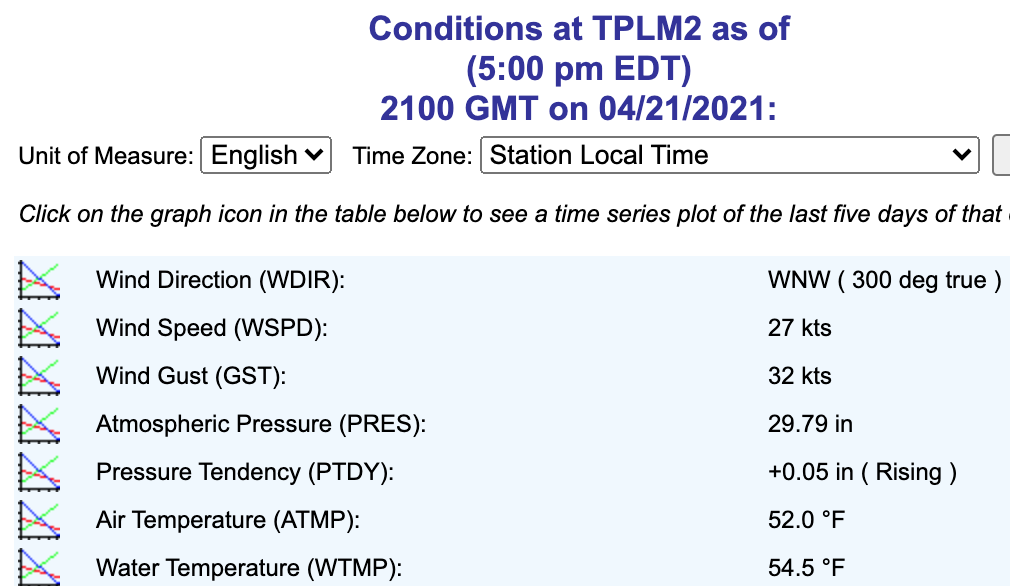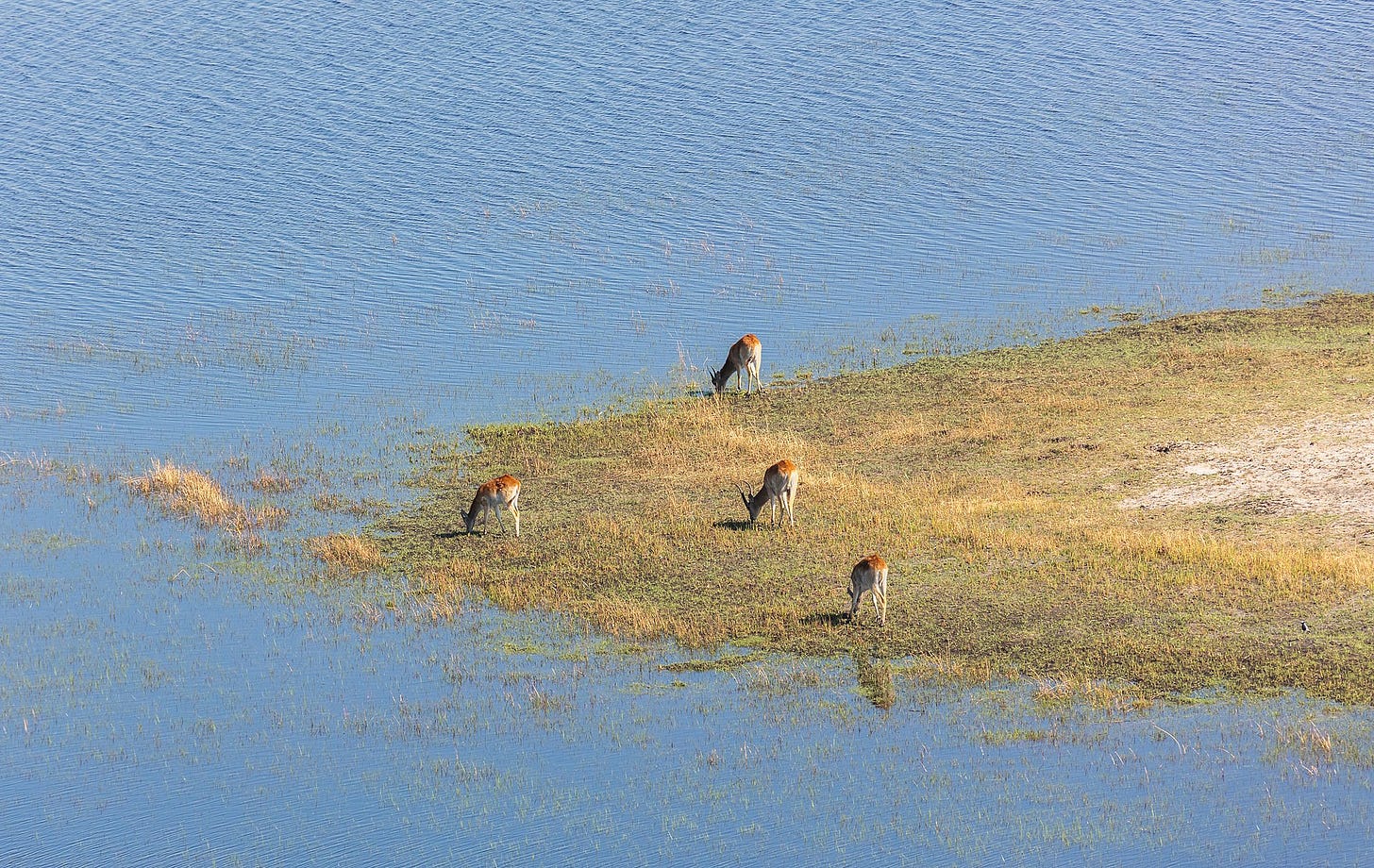Wednesday Night Racing (Almost)
Because weather (and vaccines)...
It was all supposed to start out on the water on Wednesday evening. And a steady 10 knots would have been my preferred breeze for the Moondust crew to race together for the first time (actually, I’d be happy to race in that all the time). Instead, we got a gale warning and these conditions at Thomas Point just before race time:
As I watched the forecast from Monday on, I had the classic skipper’s dilemma. The skipper is responsible for deciding whether to race or not, and I have to admit that I am not one of those sailors who loves to go out in screaming winds and get the sh*t kicked out of me, the crew and the boat. Maybe that feels good once you are back in a bar, or if you race all the time on San Francisco Bay. But I am a product of the Chesapeake Bay. I enjoy mellow, stress-free, racing. Lightish winds, as long as they are not too unsteady or too light, are my happy place.
Still, I didn’t want to pull the plug on our first outing too quickly. I didn’t want to disappoint any crew who were eager to race or might love big conditions. And if there was racing we’d start out the first series with a DNC, and have little margin for error going forward. What tipped me over was the fact that I was scheduled to get my second COVID vaccine dose Wednesday morning (as was another member of the crew). Even if the forecast moderated enough to go sailing safely it wouldn’t be ideal to be feeling less than 100%. Also, a few texts from crew noting the “sporty” conditions gave me the sense that the crew would be okay not getting creamed on our first outing. So Tuesday night, I pulled the plug on Moondust going out racing Wednesday night.
That felt like the right call, for sure. And on Wednesday the Annapolis Yacht Club agreed and cancelled all Wednesday Night Racing. So no scoring penalty for Moondust not showing up. Plus, by Wednesday night I felt pretty achy and crappy overall, and the other newly vaccinated crew felt even worse. Sometimes, you make a decision and have zero regrets. Next week is sure to be better (wait, did I just jinx it?).
Swimming With Orcas: I am not generally a fan of placing cameras on orcas or other wild mammals (too invasive and possibly distracting). But I have to admit the video captured by University of British Columbia delivers a unique perspective by taking you inside a traveling pod for a minute or two. Two things caught my attention: 1) how tight and tactile these orcas are (though I kinda knew this); and 2) how little energy (and movement) it takes for them to glide along. You can look at a selection of underwater and drone video from UBC posted here.
Vive Le Roi: If you followed the Vendee Globe you couldn’t help but follow the amazing performance of Jean Le Cam. He drinks, he smokes, he rescues a competitor, he has a wild mop of hair. And he finishes 4th overall, at age 61, in an old boat. How can anyone not love this guy? Well, pretty much everyone does, as Ed Gorman explains in this profile:
Jean Le Cam earned his ‘King’ nickname thanks to his utter domination of the Solitaire du Figaro circuit 20 years ago, which he won three times. He is one of those unreconstructed characters in French sailing (Francis Joyon is another) who has never tried to change his natural persona to meet the needs of commercial backers.
Outspoken, and a man who loves a drink and a smoke, he can be, by his own admission, a pain in the arse. But his relationship with boats and the sea gives him a unique aura. He has a knack of explaining why he loves sailing, and what motivates him, that people find compelling.
When he reached Les Sables d’Olonne at the end of January, he was exhausted by the stress of worrying whether his boat would fall apart before he got there (due to delamination issues he only revealed at the finish), his diction slurring. Yet Le Cam spoke like a philosopher about why he is still doing the Vendée Globe – and who is to bet against him turning up again in 2024?
“It’s the dreams,” he said. “It’s the extremes, it’s about things which are unreachable in daily life. You need to know what is bad to know what is good. You need to know unhappiness to know what is love… When you start accumulating difficulties, it becomes hell. And later on when you get out of it, it is true happiness. Two days ago it was quite difficult, a week ago it was horrible but today it is incredible.”
It is good to be King, and even better to be a Philosopher King. And that is why French sailors, from Moitessier on, are so compelling.
Rogue Wave Radar: It’s always been hard to measure or predict rogue waves at sea. But if you are a sailor you don’t need the waves to be 80-100 feet to start praying for your life (see above; no sailboater would be laughing like the watchstander). Some places, like the Southeast Coast of Africa where the Agulhas Current runs fast, are particularly dangerous.
One tech that could help mariners avoid trouble is computer modeling. And scientists are hopeful that they can greatly increase the accuracy of their models by using a new tool to measure waves: radar altimeters from satellites.
We’ll see. The best strategy is still to avoid bad weather altogether, if possible.
Data To Ponder: A recent study calculated that just 19% of the Earth’s landmass can be considered “wild” and untouched by humans. Interestingly, the same study also concludes that 10,000 years ago the proportion of the planet that was untouched was 27%. That is contrary to perceptions of a pristine planet before modernity ravaged the wild. In reality, as early as 12,000 years ago humans had already dispersed across three-quarters of the planet (excluding Antarctica).
So the big difference between then and now is not how much of the planet was “wild,” but how humanity treated the land. And all the evidence suggests that indigenous peoples mostly helped sustain and manage biodiversity, living in greater harmony with the planet, while land-use practices of modern humanity (in addition, presumably, to much greater population numbers) have greatly undermined biodiversity. (Source).
That’s all for today. If you would like to receive the latest Sailing Into The Anthropocene in your inbox when it is published, please subscribe here.
If you are into cycling, check out my new Substack: Lunch Ride Lunatic.






Give this a try for checking the current conditions at Thomas Point: https://buoy.report/s/ThomasPoint.htm
And Annapolis: https://buoy.report/s/Annapolis.htm
Both are much easier to read on a phone.